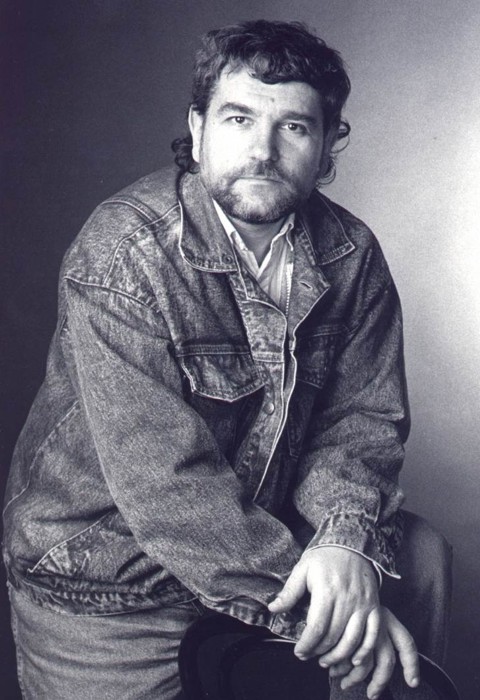|
From interview to Mark Kotlarsky
(newspaper "Vryemya"):
Human rights activist, dissident, a man struggling for preservation of [local] culture: cooperating with HTC (People's-Labour-Union) and taking part in the First ÍÒÑ's Congress in St. Petersburg; regularly delivering important human rights related information to "Washington Post" and "Chicago Tribune", and American embassy...
Lev Gunin - musician, publicist and interpreter, whose works were published in various foreign editions and "Samizdat", working in archives of Bobruisk and Minsk to rescue pieces of [Litwanian (Belarus), Polish, Russian and] Yiddish history.
He was systematically persecuted by the authorities, exposed to threats and beatings. During "Perestroika" Lev was one of those who accepted active participation in creation of Yiddish community and revival of the Yiddish culture in Bobruisk [contrary to "israelisation"].
http://zhurnal.lib.ru/editors/g/gunin_l_m/biokot.shtml
From Marina Tarasova's
article in stixi.ru :
Philosopher, who created (...) "3 [original] philosophic theories: "multiplication", "interruption", and "theory of backward values" [social psycho-phisical types]; journalist, whose articles were published in numerous newspapers and magazines ("Wire", "Hour", "Der Arbeiter Stimme", "Nasha Canada", "Literaturnaya Gazeta", "Vryemia", "Vesti", etc.) (...) Years and years before web-cameras, "blogs-eclogues", and common exbitionism he was one of few who invented its verbal surrogate. (...) New sorts of plants, virtual streets of exclusive web projects, personages of detective novels, songs and pictures, new technological processes, discoveries in cybernetics are called by his name. And all this occurs in spite of states' and governments' desire to corrode these 5 letters from newspapers and magazines, from books and cinema, radio and TV. (Marina Tarasova, "Gunin's Phenomenon" -- http://www.stihi.ru/2005/04/13-349 )
From Klement Orlicki's
work on Gunin:
If the XIX century is used to stagger by an overdue triumph of heroic, next century debuted with a manifest of anti-heroic. From perspective of societe actuel of that time Nietzsche’s Ubermensch was already perceived as an untermensch , who trampled the knightly (heroic) postulate. Apotheosis of heroic of Nietzsche: it’s a Mobius Strip of archetype, a completion of its final logical evolution ( finale mortalis ). (…) The rod personage of Vladimir Nabokov, Apollinaire, Franz Kafka, Patrick Suskind is a typical anti-hero, not condescending to critics of his polarity because of its total profanation ( mauvais ton! ).
Interestingly, on that early stage a new heros coexisted with a positive type (antagonist), presented as an undeniably useful and adequate character. Judge, Policemen, Burgomaster, Colonel, Governor: all were suppressing by their adequacy, but, in spite of luck of any critics in their address, caused fear, showed off.
Out of philosophy, art and literature such a coexistence continued (in XXI century), stalking the turncoats-artists with quakers and bankers, heads of secret services, politicians, generals, jailers and executioners. Pretending (after Nietzsche) to eliminate the whole board of moral values, culturological mainstream has actually steak to an alternative board, no matter: just implied. Practice of avoiding naming has created its twisted shadow, where crooks and manipulators, heads of profanation museums, popular critics (treated kindly by the regime), presidents’ advisors, and winners of prestigious awards are hiding. (…)
Such an ethical dualism in a shape of the moral’s splitting could exist infinity, up to the "end of civilisation", if not… However, even regarding that "if not…" the ere of "post-hero" exists and will continue to exist, as the punctuation mark has appeared in one exemplar, which is not available for duplication and can not be rationally comprehended. Gunin can’t be recreated, like an alien spaceship with all its personal can’t be replicated. He can not be imitated, as everything that has an outer logic. Just he, the only one, was chosen to combine in himself an antihero with anti-antihero, which was not possible to anyone.
(Orlicki, Klement Nikolayevich, "Alternative Share, or an Anti-Anti-Hero")
http://nowajaglawa.webs.com/
[ all 3 extracts were translated from Russian originals via machine translation ]

|